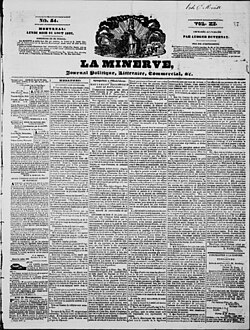 Front page of the August 21, 1837 of La Minerve, displaying the eponymous Minerva | |
| Owner | Ludger Duvernay |
|---|---|
| Founder | Augustin-Norbert Morin |
| Founded | 1826 |
| Ceased publication | 1899 |
| Headquarters | Montreal, Lower Canada |
La Minerve (French for "The Minerva") was a newspaper founded in Montreal, Lower Canada (present-day Quebec) by Augustin-Norbert Morin to promote the political goals of Louis-Joseph Papineau's Parti patriote. It was notably directed by Ludger Duvernay in its earlier years. It existed from 1826 to 1837, and again from 1842 to May 27, 1899. [1] Throughout the years, it went from being a radical paper to a conservative one.